Hiring the right WooCommerce developer can make or break your e-commerce project. Finding candidates who possess the right mix of technical skills, problem-solving abilities, and WooCommerce-specific knowledge is crucial for success.
This comprehensive guide provides a curated list of WooCommerce interview questions tailored for different experience levels and specializations. From basic concepts to advanced plugin development and store management, these questions will help you evaluate candidates thoroughly.
By using these questions, you can identify top WooCommerce talent and make informed hiring decisions. Consider supplementing your interview process with a PHP WordPress online test to get a more complete picture of candidates' skills.
Table of contents
10 WooCommerce interview questions to initiate the interview
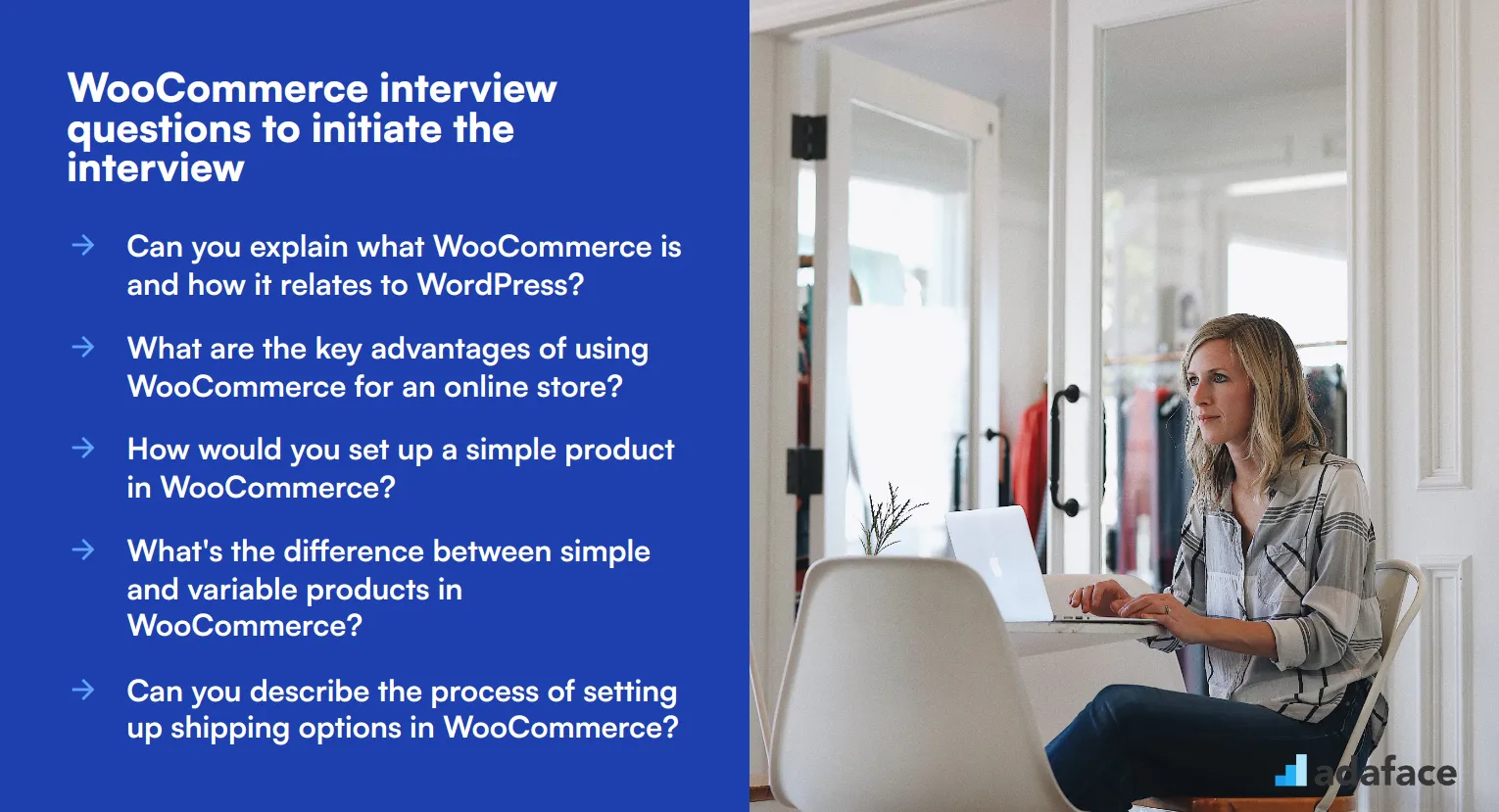
To kickstart your interview process and gauge a candidate's foundational knowledge of WooCommerce, consider using these introductory questions. These queries are designed to help you assess the applicant's understanding of WooCommerce basics and their potential fit for your e-commerce team.
- Can you explain what WooCommerce is and how it relates to WordPress?
- What are the key advantages of using WooCommerce for an online store?
- How would you set up a simple product in WooCommerce?
- What's the difference between simple and variable products in WooCommerce?
- Can you describe the process of setting up shipping options in WooCommerce?
- How do you handle tax calculations for different regions in WooCommerce?
- What are some popular payment gateways that integrate well with WooCommerce?
- How would you approach optimizing a WooCommerce store for better performance?
- Can you explain the role of hooks and filters in extending WooCommerce functionality?
- What strategies would you use to secure a WooCommerce store against common threats?
8 WooCommerce interview questions and answers to evaluate junior developers
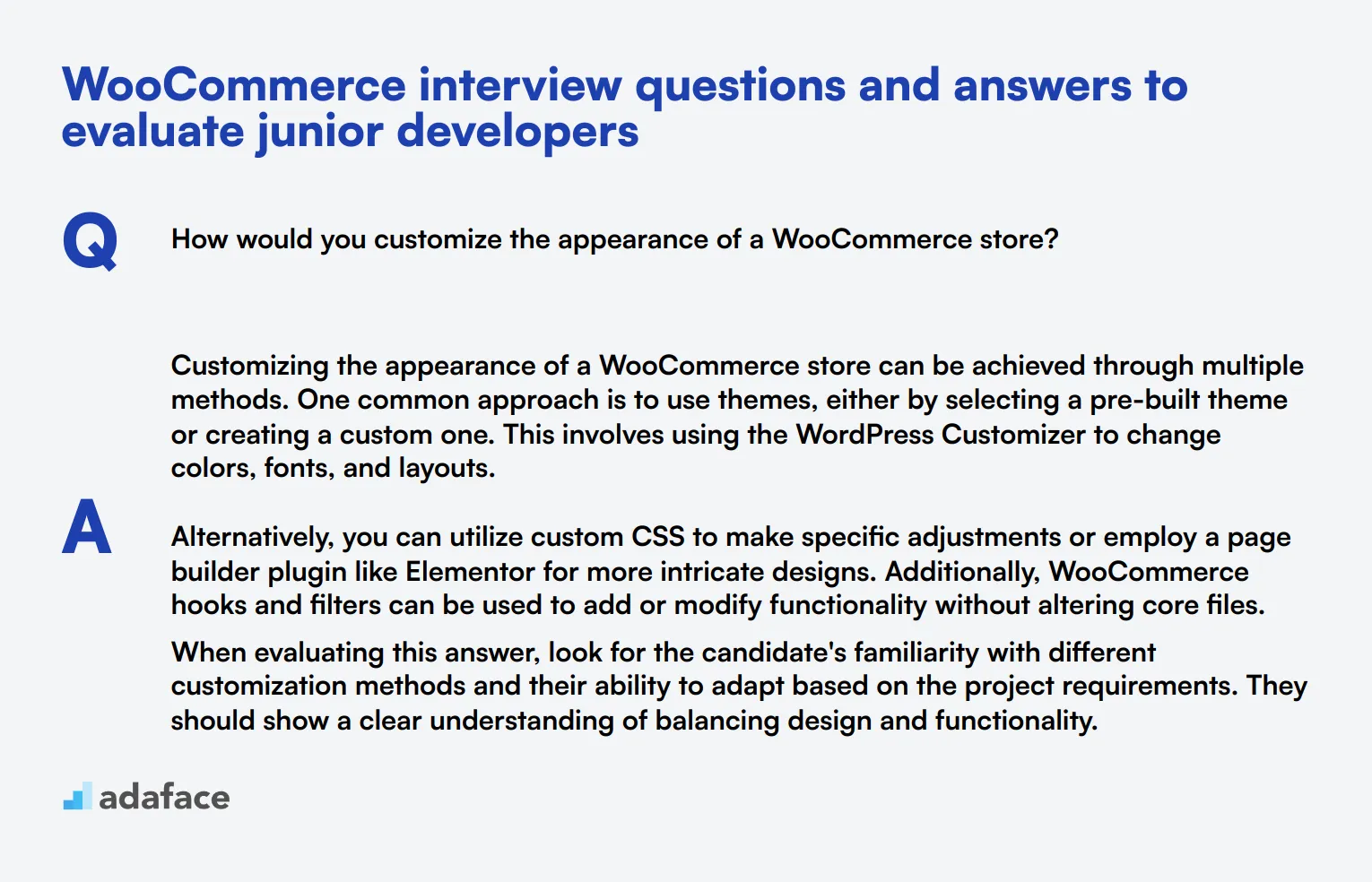
To find out if a junior developer has the essential skills for working with WooCommerce, ask them these interview questions. They are designed to be straightforward and effective for gauging basic WooCommerce knowledge.
1. How would you customize the appearance of a WooCommerce store?
Customizing the appearance of a WooCommerce store can be achieved through multiple methods. One common approach is to use themes, either by selecting a pre-built theme or creating a custom one. This involves using the WordPress Customizer to change colors, fonts, and layouts.
Alternatively, you can utilize custom CSS to make specific adjustments or employ a page builder plugin like Elementor for more intricate designs. Additionally, WooCommerce hooks and filters can be used to add or modify functionality without altering core files.
When evaluating this answer, look for the candidate's familiarity with different customization methods and their ability to adapt based on the project requirements. They should show a clear understanding of balancing design and functionality.
2. What steps would you take to troubleshoot a slow WooCommerce site?
To troubleshoot a slow WooCommerce site, I would start with analyzing the hosting environment. Ensuring that the server resources meet the website's demands is crucial. Next, I would check for any resource-heavy plugins or themes.
Optimizing images and enabling caching are also vital steps. Using a CDN (Content Delivery Network) can improve load times significantly. Database optimization and reducing the number of HTTP requests are additional strategies to enhance performance.
Candidates should demonstrate a systematic approach to troubleshooting. Look for an understanding of various aspects that can impact site speed and the ability to pinpoint issues accurately.
3. How would you handle customer inquiries about product availability in WooCommerce?
Handling customer inquiries about product availability involves ensuring that the inventory management settings are correctly configured in WooCommerce. I would make sure that stock levels are updated in real-time and that stock statuses such as 'In Stock', 'Out of Stock', and 'Backorder' are clearly visible to customers.
Additionally, setting up automated email notifications for customers regarding stock status changes can improve communication. For a more interactive approach, integrating a live chat feature can provide instant responses to customer queries.
The ideal candidate should show a proactive approach to customer service and a thorough understanding of WooCommerce's inventory management features. Look for strategies that enhance customer experience and communication.
4. What are some common challenges you might face when managing a WooCommerce store?
Common challenges when managing a WooCommerce store include handling large inventories, maintaining website performance, and ensuring secure transactions. Managing product variations and attributes can become complex, especially with a vast catalog.
Another challenge is staying updated with WooCommerce and WordPress updates while ensuring compatibility with installed plugins and themes. Additionally, managing shipping and tax settings for different regions requires attention to detail.
Look for candidates who can identify these challenges and propose practical solutions. Their ability to anticipate and mitigate issues is a good indicator of their experience and problem-solving skills.
5. How do you keep a WooCommerce store secure?
To keep a WooCommerce store secure, I would start by ensuring that both WooCommerce and WordPress are updated to the latest versions. Regularly updating themes and plugins is also crucial. Using strong passwords and implementing two-factor authentication adds an additional layer of security.
I would recommend installing security plugins that monitor and protect against threats, such as malware and brute force attacks. Regular backups are essential to recover data in case of a security breach.
An ideal candidate should emphasize the importance of proactive security measures and demonstrate knowledge of common security practices. Look for their understanding of both preventive and responsive security strategies.
6. How would you set up a WooCommerce store for international customers?
To set up a WooCommerce store for international customers, I would start by configuring the currency and language settings. Using a multi-currency plugin can help display prices in various currencies. Integrating a translation plugin like WPML can make the store accessible in multiple languages.
Next, I would configure international shipping options and ensure that tax settings comply with different countries' regulations. Offering multiple payment gateways that cater to international audiences is also essential.
Candidates should demonstrate a clear understanding of the complexities involved in international eCommerce. Look for their ability to address currency, language, shipping, and legal requirements effectively.
7. How would you handle product returns and refunds in WooCommerce?
Handling product returns and refunds in WooCommerce involves setting clear policies and configuring the system to manage them efficiently. I would first define the return and refund policies and communicate them clearly on the website.
WooCommerce allows setting up automated processes for returns and refunds through the settings. Using plugins like WooCommerce Returns and Warranty Requests can streamline the process by providing customers with a straightforward interface to manage their returns.
Look for candidates who can balance customer satisfaction with efficient management of returns. They should show an understanding of both the technical setup and the importance of transparent policies.
8. What are some effective ways to market a WooCommerce store?
Effective ways to market a WooCommerce store include using social media marketing, email marketing, and SEO optimization. Engaging content and social media ads can drive traffic, while email campaigns help retain customers.
Additionally, setting up a blog to provide valuable content related to the products can improve SEO rankings. Collaborating with influencers and offering promotions or discounts are also effective marketing strategies.
Candidates should exhibit a comprehensive approach to marketing. Look for their understanding of different marketing channels and how they can be leveraged to increase traffic and sales.
15 intermediate WooCommerce interview questions and answers to ask mid-tier developers.
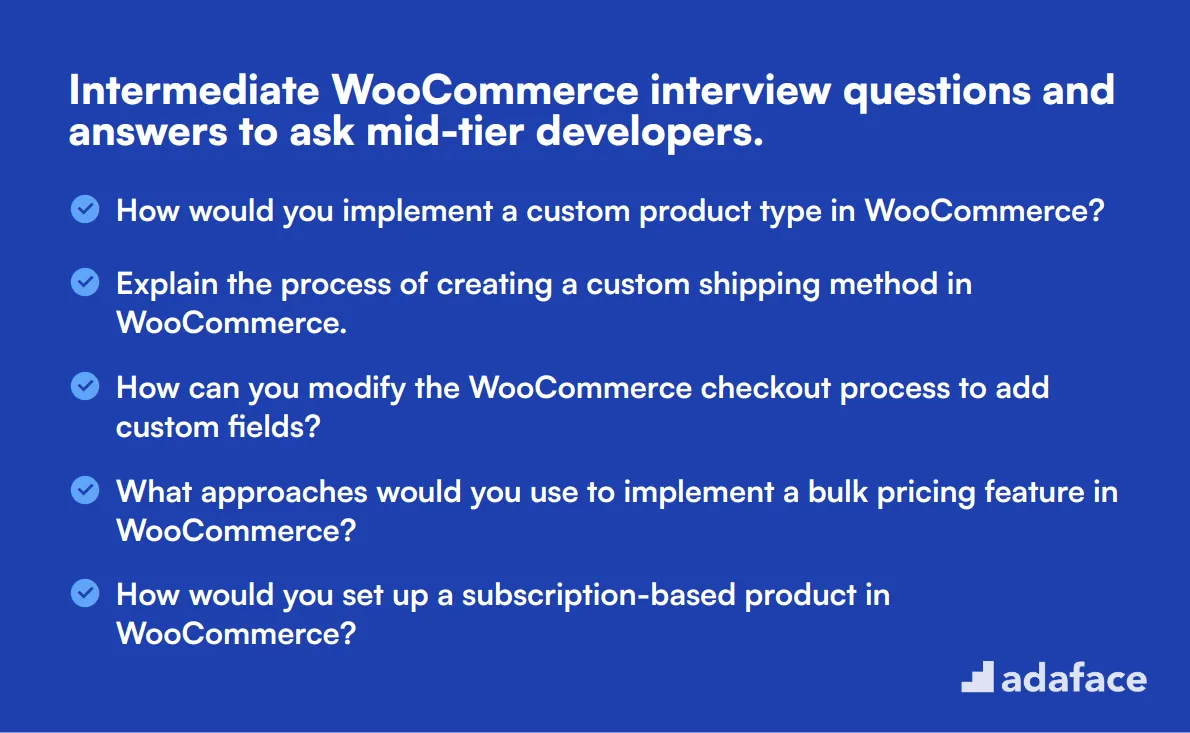
To assess the WooCommerce skills of mid-tier developers, use these 15 intermediate interview questions. They'll help you gauge a candidate's deeper understanding of WooCommerce functionality, customization abilities, and problem-solving skills in real-world scenarios.
- How would you implement a custom product type in WooCommerce?
- Explain the process of creating a custom shipping method in WooCommerce.
- How can you modify the WooCommerce checkout process to add custom fields?
- What approaches would you use to implement a bulk pricing feature in WooCommerce?
- How would you set up a subscription-based product in WooCommerce?
- Describe how you would create a custom WooCommerce widget.
- How can you implement a loyalty points system in WooCommerce?
- What steps would you take to create a custom WooCommerce email template?
- How would you integrate a third-party inventory management system with WooCommerce?
- Explain how you would set up a multi-vendor marketplace using WooCommerce.
- How can you implement a custom product recommendation system in WooCommerce?
- What approach would you take to create a custom WooCommerce REST API endpoint?
- How would you implement a custom order status and associated workflow in WooCommerce?
- Describe the process of creating a custom WooCommerce payment gateway.
- How would you optimize WooCommerce for a high-traffic, large inventory store?
7 advanced WooCommerce interview questions and answers to evaluate senior developers
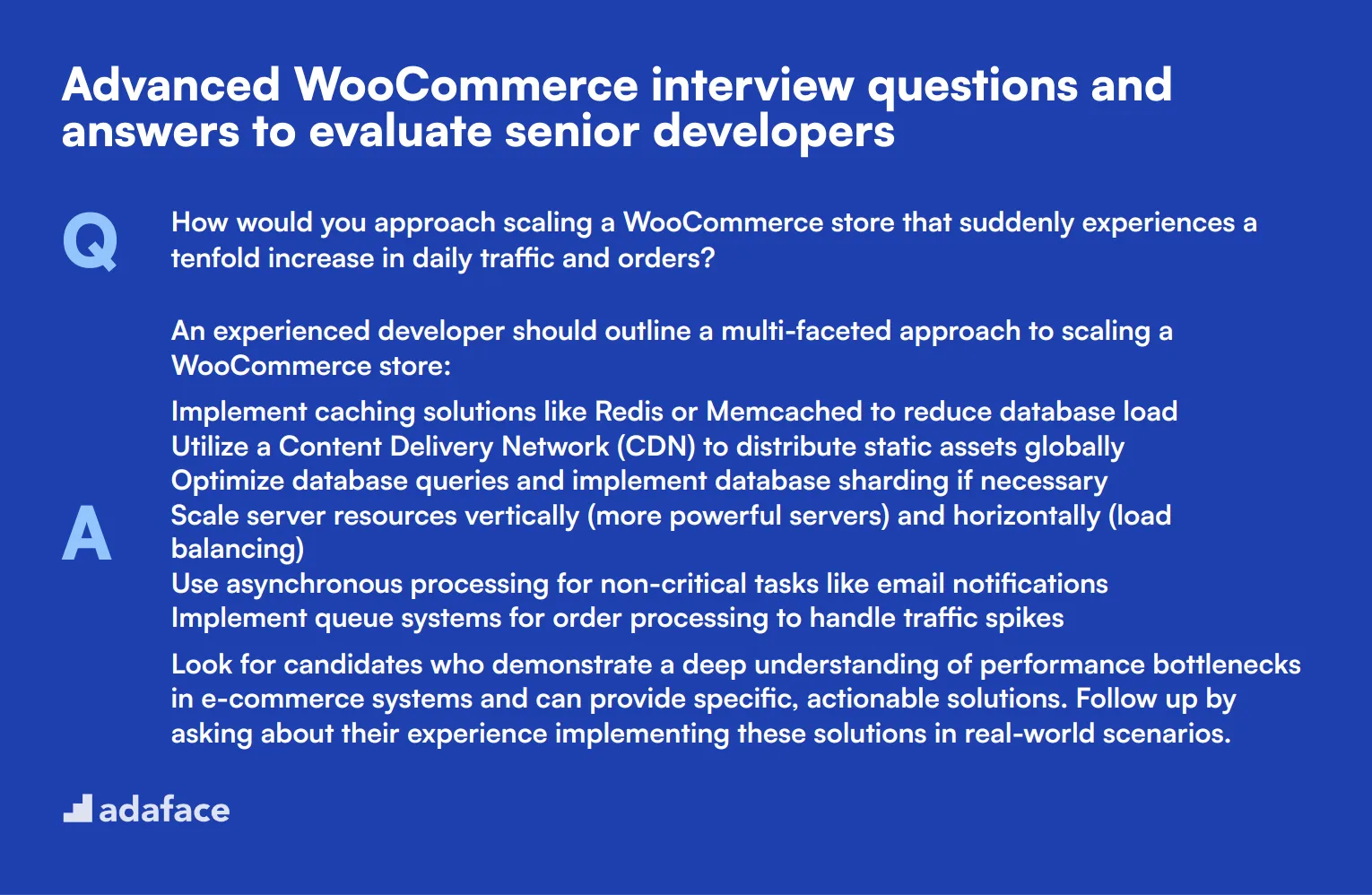
Ready to separate the WooCommerce wizards from the novices? These advanced questions will help you identify senior developers who can tackle complex e-commerce challenges. Use this list to dive deep into a candidate's expertise and problem-solving skills, ensuring you find the right fit for your WooCommerce development team.
1. How would you approach scaling a WooCommerce store that suddenly experiences a tenfold increase in daily traffic and orders?
An experienced developer should outline a multi-faceted approach to scaling a WooCommerce store:
- Implement caching solutions like Redis or Memcached to reduce database load
- Utilize a Content Delivery Network (CDN) to distribute static assets globally
- Optimize database queries and implement database sharding if necessary
- Scale server resources vertically (more powerful servers) and horizontally (load balancing)
- Use asynchronous processing for non-critical tasks like email notifications
- Implement queue systems for order processing to handle traffic spikes
Look for candidates who demonstrate a deep understanding of performance bottlenecks in e-commerce systems and can provide specific, actionable solutions. Follow up by asking about their experience implementing these solutions in real-world scenarios.
2. Describe a situation where you had to create a custom WooCommerce extension to meet unique business requirements. What was your approach?
A strong candidate should be able to walk through their process of creating a custom WooCommerce extension:
- Understanding the business requirements and translating them into technical specifications
- Deciding whether to create a plugin or modify theme functions
- Utilizing WooCommerce hooks and filters to integrate the new functionality
- Implementing custom database tables if necessary
- Ensuring the extension is scalable and doesn't negatively impact performance
- Testing thoroughly, including compatibility with other plugins and themes
- Documenting the code and providing usage instructions
Pay attention to how the candidate balances technical implementation with business needs. Look for mentions of best practices in WordPress development and WooCommerce-specific considerations.
3. How would you implement a complex pricing strategy that includes tiered wholesale pricing, time-based discounts, and customer-specific rates?
An adept WooCommerce developer should outline a strategy involving custom plugins and core WooCommerce modifications:
- Create a custom plugin to handle the pricing logic
- Utilize WooCommerce's pricing hooks to intercept and modify prices
- Implement a database structure to store tiered pricing, time-based discounts, and customer-specific rates
- Use WordPress cron jobs or a separate caching mechanism to manage time-based discounts efficiently
- Modify the cart and checkout process to reflect the complex pricing accurately
- Ensure the solution is scalable and doesn't significantly impact page load times
Evaluate the candidate's understanding of WooCommerce's pricing architecture and their ability to extend it without breaking core functionality. Inquire about potential performance implications and how they would mitigate them.
4. What strategies would you employ to optimize the checkout process for a high-volume WooCommerce store?
A seasoned WooCommerce developer should suggest multiple optimization strategies:
- Implement a multi-step checkout to reduce form complexity
- Use AJAX for real-time field validation and updates
- Optimize database queries related to checkout
- Implement address autocomplete to reduce user input errors
- Use lazy loading for non-critical checkout elements
- Implement a persistent cart functionality
- Optimize payment gateway integrations for faster processing
- Use caching for static elements of the checkout page
Look for candidates who not only understand technical optimizations but also consider user experience in their approach. Ask them to elaborate on how they would measure the impact of these optimizations on conversion rates.
5. How would you approach integrating a WooCommerce store with a complex ERP system for real-time inventory and order management?
An experienced developer should outline a comprehensive integration strategy:
- Analyze the ERP system's API or data exchange capabilities
- Design a middleware or use existing integration plugins if suitable
- Implement real-time or scheduled syncing of inventory levels
- Create a system for bi-directional order data flow
- Handle error scenarios and data conflicts
- Implement logging and monitoring for the integration
- Ensure the solution is scalable to handle high volumes of data transfer
Assess the candidate's experience with API integrations and their understanding of potential challenges in syncing e-commerce platforms with ERP systems. Inquire about their approach to ensuring data integrity and handling potential system downtimes.
6. Describe how you would implement a custom analytics dashboard for store owners to track advanced metrics not available in standard WooCommerce reports.
A proficient WooCommerce developer should propose a solution that involves:
- Creating a custom plugin to gather and process data
- Utilizing WordPress hooks to capture relevant events and data points
- Implementing a database structure to store processed metrics
- Creating a user-friendly dashboard interface using WordPress admin pages
- Implementing data visualization using libraries like Chart.js or D3.js
- Ensuring the solution is optimized for performance, especially for stores with large datasets
- Providing export functionality for further analysis
Look for candidates who demonstrate knowledge of both WooCommerce data structures and WordPress plugin development. Ask about their experience with data analysis and how they would ensure the accuracy of custom metrics.
7. How would you approach implementing a headless WooCommerce setup using a modern JavaScript framework for the frontend?
A forward-thinking WooCommerce developer should outline an approach that includes:
- Utilizing WooCommerce REST API or creating custom endpoints as needed
- Choosing an appropriate JavaScript framework (e.g., React, Vue, or Angular)
- Implementing state management for cart and checkout processes
- Ensuring proper authentication and security measures
- Optimizing for performance, including server-side rendering if necessary
- Handling SEO considerations in a headless setup
- Managing complexities around payment gateways and PCI compliance
Evaluate the candidate's understanding of both WooCommerce backend structures and modern frontend technologies. Inquire about their experience with API-first architectures and how they would handle challenges specific to e-commerce in a headless setup.
12 WooCommerce interview questions about plugin functionality
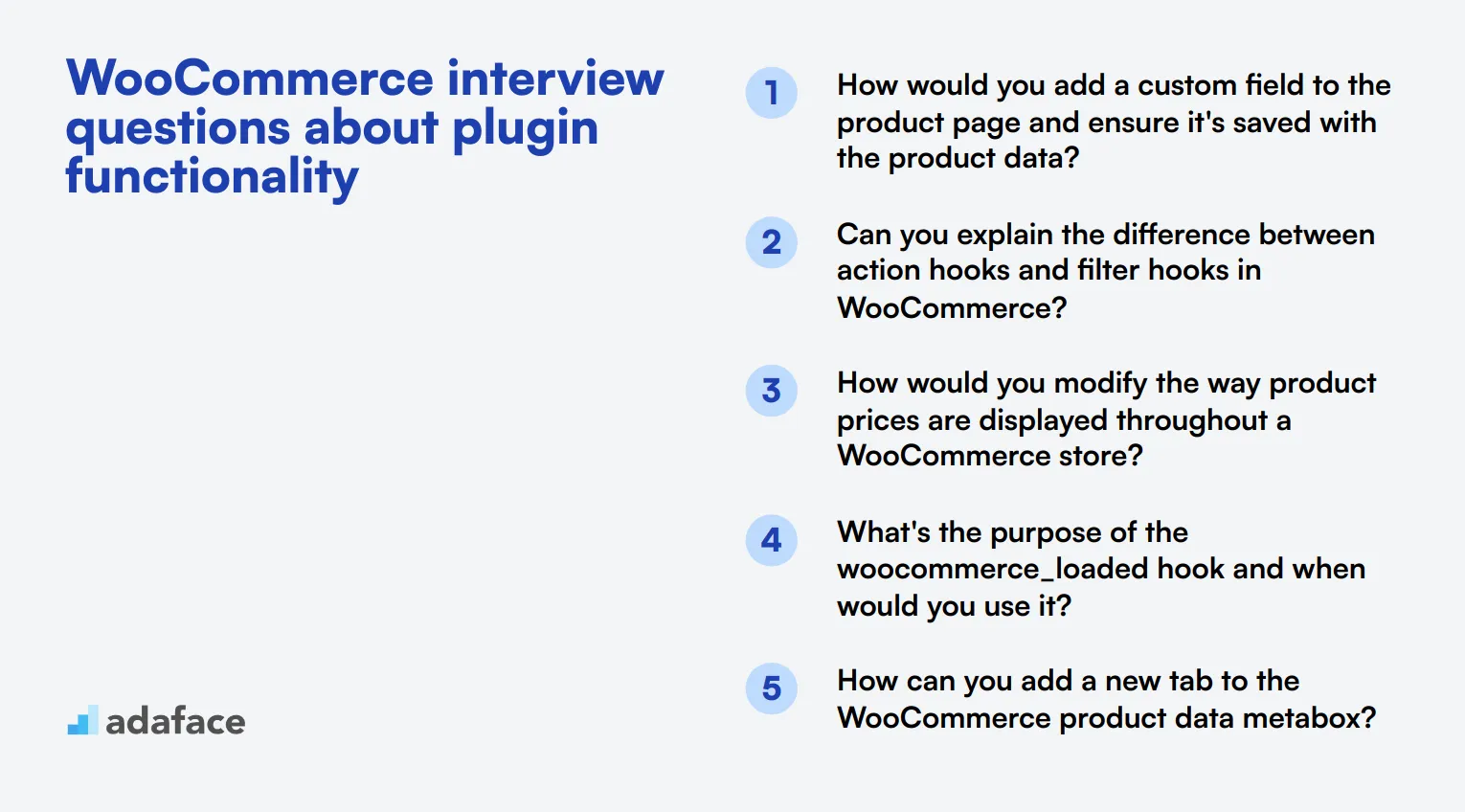
To assess a candidate's proficiency with WooCommerce's plugin functionality, use these targeted questions. They'll help you gauge the applicant's ability to extend and customize WooCommerce, which is crucial for creating unique and powerful e-commerce solutions.
- How would you add a custom field to the product page and ensure it's saved with the product data?
- Can you explain the difference between action hooks and filter hooks in WooCommerce?
- How would you modify the way product prices are displayed throughout a WooCommerce store?
- What's the purpose of the woocommerce_loaded hook and when would you use it?
- How can you add a new tab to the WooCommerce product data metabox?
- Explain how you would create a custom product type in WooCommerce and what files would be involved.
- How would you programmatically create a coupon in WooCommerce?
- What's the difference between wc_get_product() and get_product() functions?
- How can you modify the WooCommerce checkout fields programmatically?
- Explain how you would add a custom column to the WooCommerce orders admin page.
- How would you create a custom WooCommerce endpoint for the My Account page?
- What's the purpose of the wc_get_template() function and how would you use it?
12 WooCommerce interview questions about store management
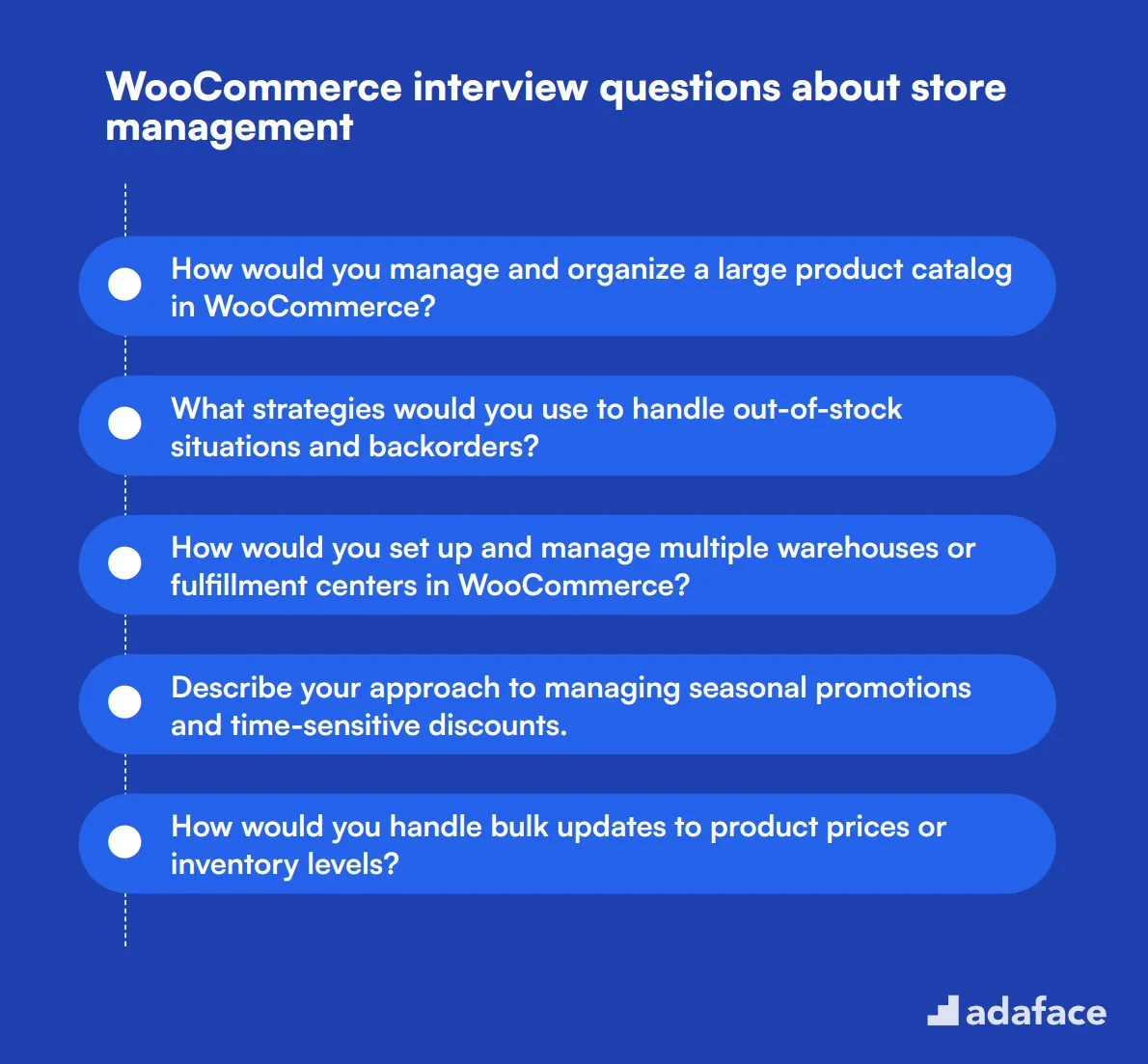
To assess a candidate's ability to effectively manage a WooCommerce store, consider asking some of these 12 interview questions. These questions will help you evaluate the applicant's understanding of store management tasks and their problem-solving skills in real-world scenarios.
- How would you manage and organize a large product catalog in WooCommerce?
- What strategies would you use to handle out-of-stock situations and backorders?
- How would you set up and manage multiple warehouses or fulfillment centers in WooCommerce?
- Describe your approach to managing seasonal promotions and time-sensitive discounts.
- How would you handle bulk updates to product prices or inventory levels?
- What methods would you use to track and analyze store performance metrics?
- How would you manage customer roles and implement a tiered pricing system?
- Describe your process for managing and updating product variations efficiently.
- How would you handle cross-sells and upsells in a WooCommerce store?
- What strategies would you employ to reduce shopping cart abandonment?
- How would you manage and streamline the order fulfillment process?
- Describe your approach to implementing and managing a dropshipping model in WooCommerce.
10 situational WooCommerce interview questions for hiring top developers
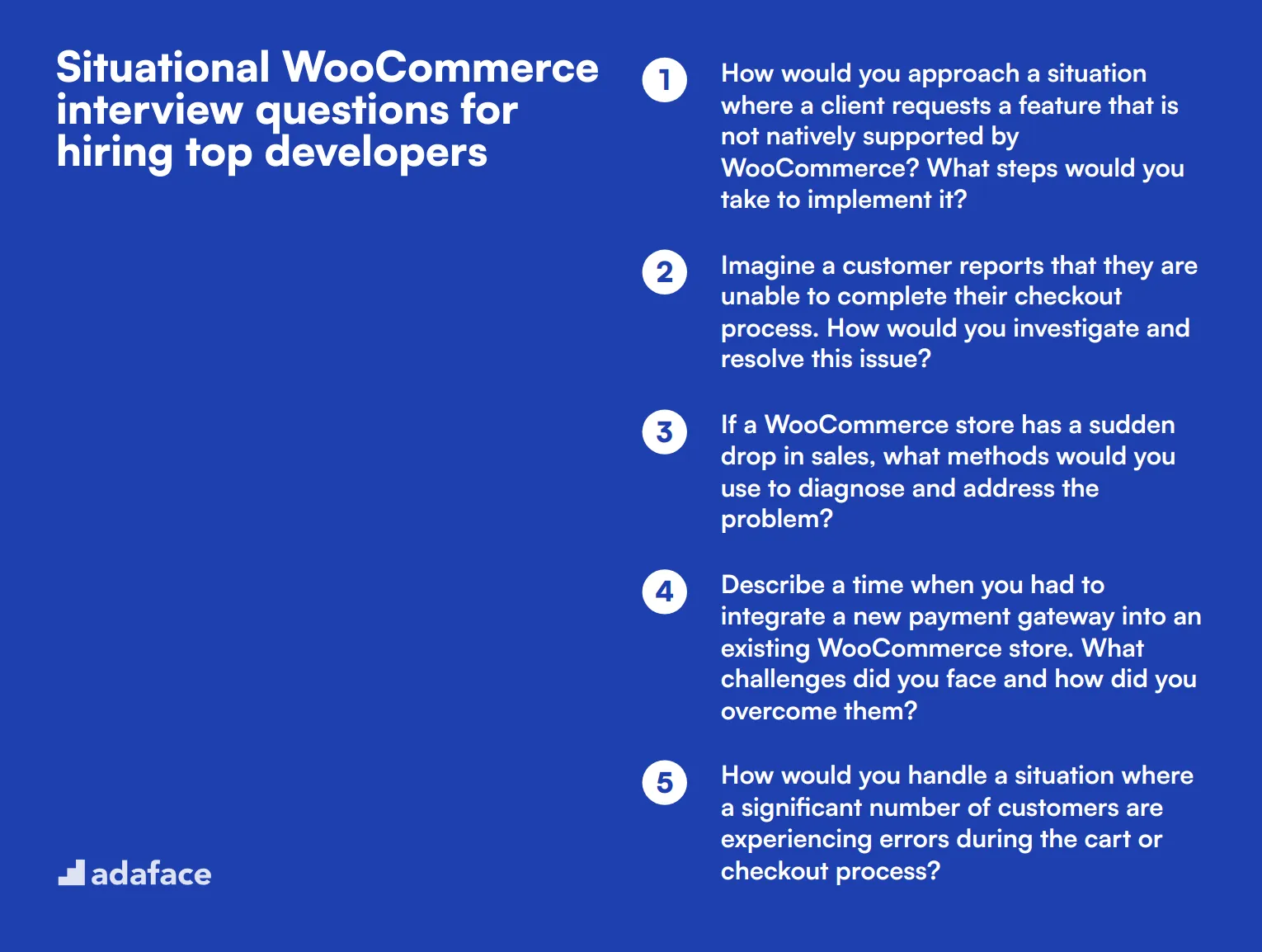
To find the best candidates for your WooCommerce development needs, use this list of situational questions to gauge their problem-solving abilities and real-world experience. These questions can help you assess how well a candidate can handle various challenges that may arise in a live store environment, ensuring you hire a skilled professional for your eCommerce team.
- How would you approach a situation where a client requests a feature that is not natively supported by WooCommerce? What steps would you take to implement it?
- Imagine a customer reports that they are unable to complete their checkout process. How would you investigate and resolve this issue?
- If a WooCommerce store has a sudden drop in sales, what methods would you use to diagnose and address the problem?
- Describe a time when you had to integrate a new payment gateway into an existing WooCommerce store. What challenges did you face and how did you overcome them?
- How would you handle a situation where a significant number of customers are experiencing errors during the cart or checkout process?
- If a client wants to implement advanced promotional features, such as buy-one-get-one-free offers, how would you go about creating this functionality?
- Imagine you need to migrate a large number of products from another platform to WooCommerce. What strategy would you use to ensure a smooth and error-free transition?
- How would you respond if a customer wants to customize their product pages with dynamic content based on user behavior?
- If you were tasked with improving the mobile experience of a WooCommerce store, what specific changes would you consider implementing?
- Describe how you would approach increasing the site speed for a WooCommerce store that has been reported as slow by users.
Which WooCommerce skills should you evaluate during the interview phase?
While it's impossible to gauge everything about a candidate in a single interview, focusing on specific core skills can provide a deep insight into their WooCommerce capabilities. This approach allows interviewers to efficiently identify candidates with the right expertise essential for the role.
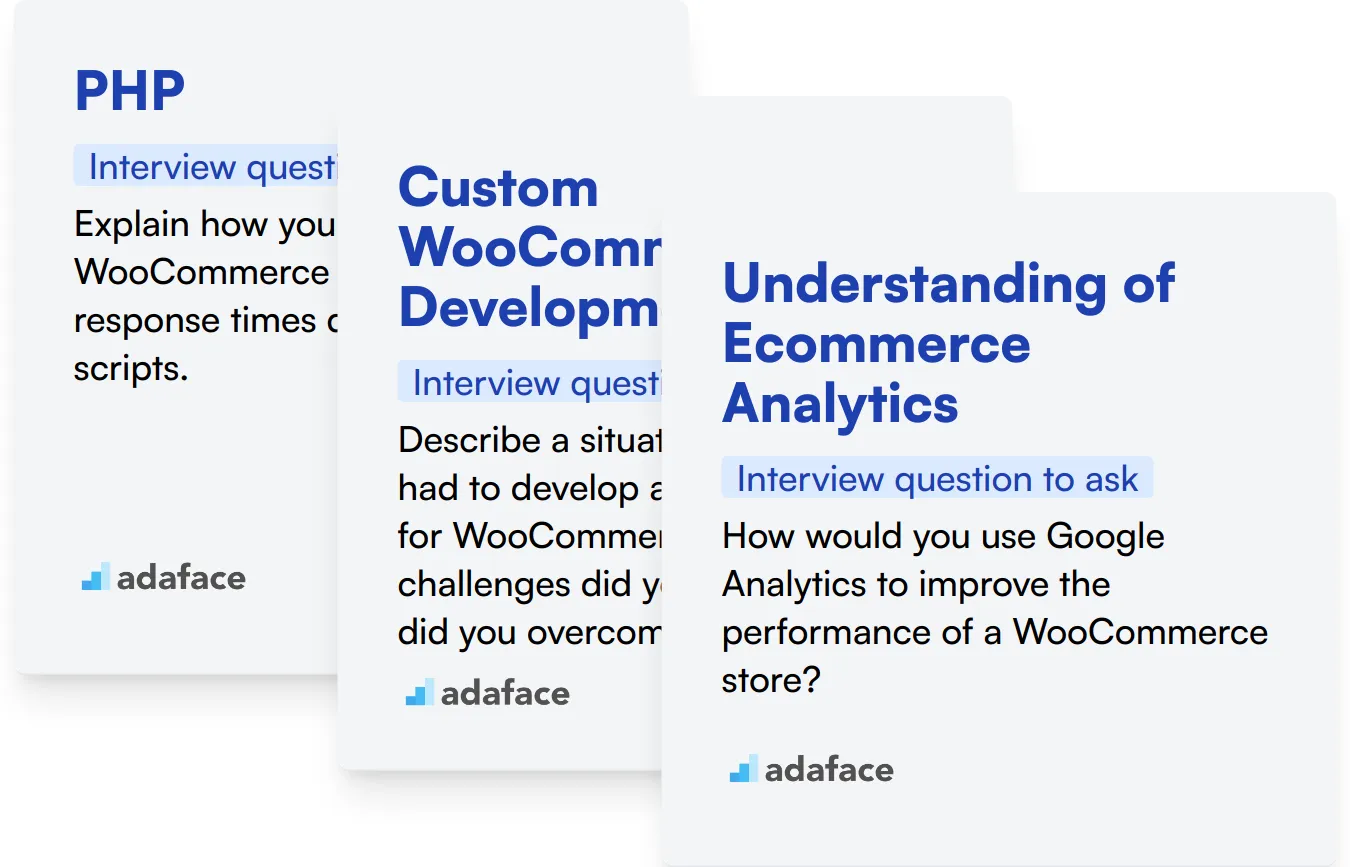
PHP
PHP is the backbone of WooCommerce, as it is the scripting language in which WordPress and WooCommerce are written. Understanding PHP helps developers create and customize powerful e-commerce sites by diving into plugin and theme development.
To assess PHP skills, interviewers could consider using PHP online tests that contain relevant multiple-choice questions to test candidates' coding skills and problem-solving abilities.
In addition to assessment tests, asking targeted PHP-related questions provides insights into a candidate's practical knowledge.
Explain how you would optimize a WooCommerce site that has slow response times due to heavy PHP scripts.
Look for answers that include specific PHP optimization techniques such as using opcode caching, optimizing database queries, and effectively using AJAX. The candidate’s response can reveal their depth of understanding and ability to apply PHP knowledge to improve WooCommerce performance.
Custom WooCommerce Development
Custom WooCommerce Development involves tailoring the WooCommerce platform to meet specific business needs through custom plugins and themes. This skill is fundamental for creating a tailored shopping experience that can adapt to unique business models.
Interview questions about custom development test the candidate’s ability to extend WooCommerce beyond its standard features.
Describe a situation where you had to develop a custom plugin for WooCommerce. What challenges did you face and how did you overcome them?
Effective answers should describe the problem-solving process, including any specific WooCommerce hooks and filters used. This response showcases the candidate’s practical skills and their approach to overcoming development challenges.
Understanding of Ecommerce Analytics
Knowledge of e-commerce analytics is critical because it helps in tracking the performance of the online store and understanding customer behavior. For WooCommerce developers, this means being able to implement and customize tracking to gather meaningful data.
Consider using Ecommerce Analytics tests to evaluate how well candidates can interpret data and make informed decisions.
To further assess this skill, you can ask questions that require candidates to think about data-driven decision-making.
How would you use Google Analytics to improve the performance of a WooCommerce store?
The candidate’s answer should include specific metrics to monitor, such as conversion rates, average order value, or cart abandonment rates, and how they would use this data to make improvements.
3 Key Tips for Effective WooCommerce Interviews
Before you start putting your new knowledge to use, here are some tips to make your WooCommerce interviews more effective. These suggestions will help you get the most out of your candidate evaluations.
1. Incorporate Skill Assessments Before Interviews
Using skill assessments before interviews can save time and improve the quality of your candidate pool. These tests help you objectively evaluate a candidate's technical abilities and problem-solving skills.
For WooCommerce roles, consider using a combination of PHP, WordPress, and e-commerce related tests. The PHP WordPress online test can assess core technical skills, while an e-commerce analytics test can evaluate their understanding of online retail concepts.
Implementing these assessments allows you to focus your interviews on candidates who have demonstrated the necessary technical proficiency. This approach streamlines your hiring process and ensures you're investing time in the most promising applicants.
2. Prepare a Balanced Set of Interview Questions
With limited interview time, it's important to choose a balanced set of questions that cover key areas. Focus on questions that assess both technical knowledge and practical application of WooCommerce concepts.
Consider including questions about related technologies like JavaScript or REST APIs. You might also want to explore the candidate's experience with digital marketing or SEO, as these skills often complement WooCommerce development.
Don't forget to assess soft skills like communication and problem-solving. These are crucial for working effectively in a team and managing client relationships in WooCommerce projects.
3. Master the Art of Follow-Up Questions
Asking follow-up questions is key to understanding a candidate's depth of knowledge and experience. It helps you distinguish between those who have memorized answers and those who truly understand WooCommerce concepts.
For example, if you ask about customizing WooCommerce templates, a good follow-up might be, "Can you describe a situation where you had to modify the checkout process?" This probes their practical experience and problem-solving approach, revealing their real-world capabilities.
Use WooCommerce interview questions and skills tests to hire talented developers
If you are looking to hire someone with WooCommerce skills, you need to ensure they have those skills accurately. The best way to do this is to use skill tests like our PHP & WordPress Online Test or Ecommerce Analytics Test.
Once you use these tests, you can shortlist the best applicants and call them for interviews. For the next step, you can sign up on our platform here.
PHP & WordPress Developer Online Test
Download WooCommerce interview questions template in multiple formats
WooCommerce Interview Questions FAQs
The questions cover junior, intermediate, and senior developer skill levels, as well as plugin functionality and store management.
The post includes 10 situational WooCommerce interview questions designed to evaluate top developers.
Yes, the post provides 3 key tips for conducting effective WooCommerce interviews.
Absolutely. The post suggests using WooCommerce interview questions in combination with skills tests to hire talented developers.

40 min skill tests.
No trick questions.
Accurate shortlisting.
We make it easy for you to find the best candidates in your pipeline with a 40 min skills test.
Try for freeRelated posts
Free resources




